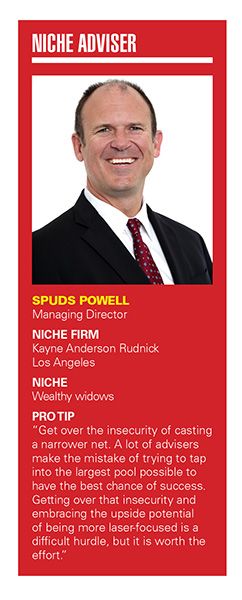A happenstance focus on wealthy widows

Spuds Powell defies popular thinking with the niche client base he's built, one that he says makes both him and his clients happy.
In the current highly polarized environment where it seems almost everything can be separated by race or gender, you can’t miss the anomaly of a 51-year-old man building a successful financial planning niche that focuses on wealthy widows.
But Spuds Powell, managing director at Los Angeles-based Kayne Anderson Rudnick, shrugs it off as something that works and makes him and his clients happy.
“I think the reason I’ve had success working with single women is that I’m able to make them feel comfortable and confident, and I’m genuinely interested in helping them, and it all boils down to my ability to earn their trust,” he said.

Powell also recognizes that his niche goes against the grain of industry research that shows women commonly start searching for a new financial adviser as soon as their husband dies.
“I can see why, all else being equal, women might be more comfortable working with a woman,” he said. “But all my clients know what my values are and what my priorities are, and many of these women can relate to the fact that I’m a family man and take pride in being the best husband and father I can be.”
Powell, who’s been with the $60 billion registered investment adviser for more than 18 years, said his niche started to emerge about a dozen years ago when a couple of his clients passed away, leaving elderly widows who didn’t have a firm sense of where to turn, from a financial perspective.
“I wasn’t trying to target widows or single women initially, it just came about organically,” he said. “I’ve had some clients pass away, and in almost every instance it was the husband. As a result, I was in a position to help the grieving surviving spouse.”
With widows now representing about a third of his client base, and growing, Powell has developed a “surviving spouse checklist,” which he describes as a “very detailed document” that’s presented to widows at some point after the initial grieving period.
“When the timing is right, it’s a great resource that enables women who have recently suffered the loss of a spouse to be able to prioritize their time and efforts,” he said.
Because many of the retired couples he works with typically leave the financial matters to the husband, Powell said the complete financial picture can be overwhelming, which is why he prioritizes what needs to be addressed and on what kind of timeline.
“For the women I’ve worked with, the passing of a husband is the most difficult time of their lives and having to also take over the reins of their financial well-being can be overwhelming,” he said. “I help them focus on what decisions need to be made, when they need to be made, and what decisions don’t need to be made. Having a document that I can leave with them, and at the appropriate time, is important.”
With an emphasis on education and keeping things in perspective, Powell follows a three-step process for getting his clients up to speed on taking charge of their financial affairs.
“Step one typically is to meet with them, help them grieve and reminisce about their husband,” he said. “Eventually, it comes time to step in and explain there are several key people they need to meet with to get affairs in order.”
Powell said he accompanies the widow throughout the process of meeting with accountants, estate planning attorneys or any other outside advisers, which is the second step.
“I make it clear what everyone’s roles are,” he said. “I’m making sure that all of her advisers are held accountable and making sure all the right questions are asked of these other advisers.”
The third step is inviting any adult children into the process.
“I’ve found that women in general, more so than men, really want their adult children to be involved,” he said. “When we’re talking about goals, objectives and risk tolerance, they are often different for the widow than they were for the couple. I always offer to include the adult children in those meetings where we’re talking about things like investment recommendations, asset allocation mix and fees. In most cases these widows gain a lot of confidence and reassurance when the children are included in the process.”
Even though Powell’s niche developed organically after the passing of some of his male clients, he has found that most of his new clients these days are coming via referrals.
“I have had a lot of success helping women who are dealing with the combination of a husband passing and from a wealth management point of view having to take over the reins of their financial well-being,” he said.
Regarding the theory that women typically search for a new adviser when their husband dies, Powell said his experience has been the opposite.
“I’ve never had a client fire us or leave after a spouse passed away, and they also tend to be more likely to make referrals,” he said. “I think the key, and the reason I’ve had success retaining all these clients, is I build strong trusting relationships with both the husbands and the wives.”
Advisers better look to Washington for changes in annuity regulations
Learn more about reprints and licensing for this article.








